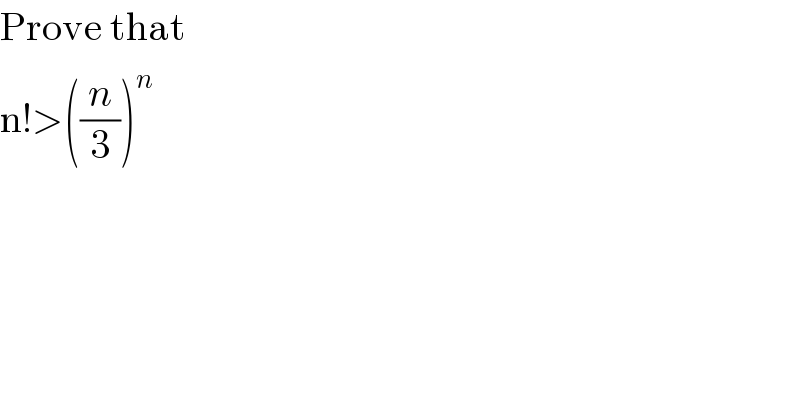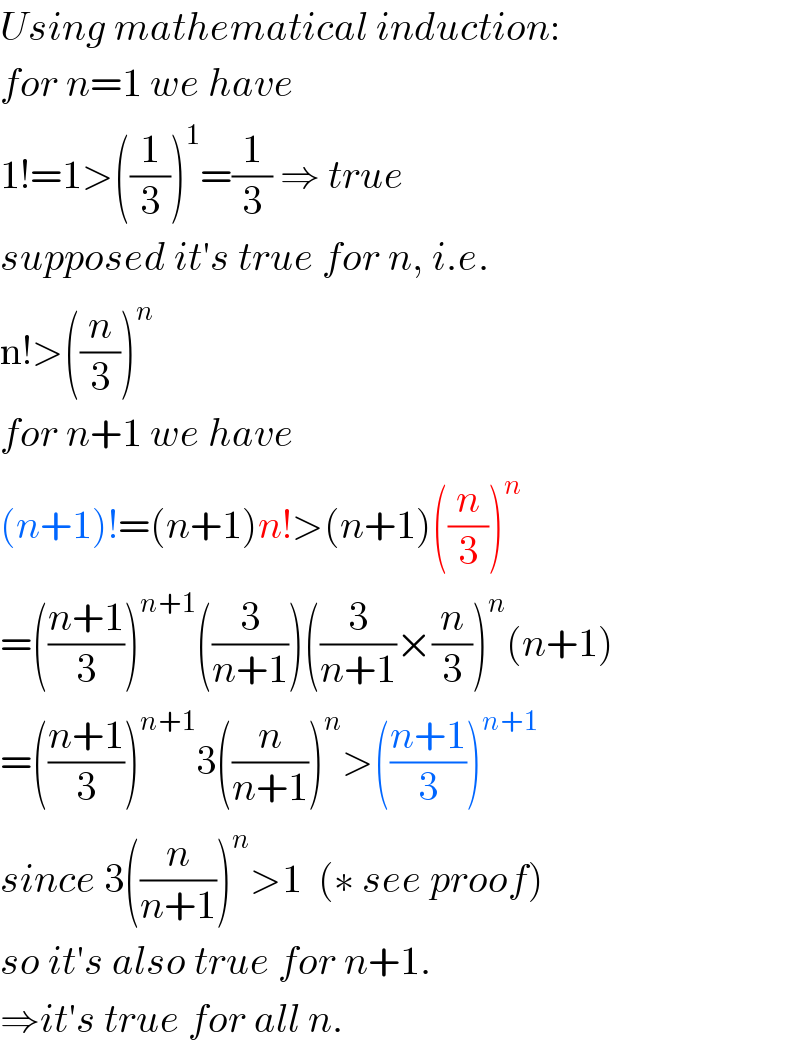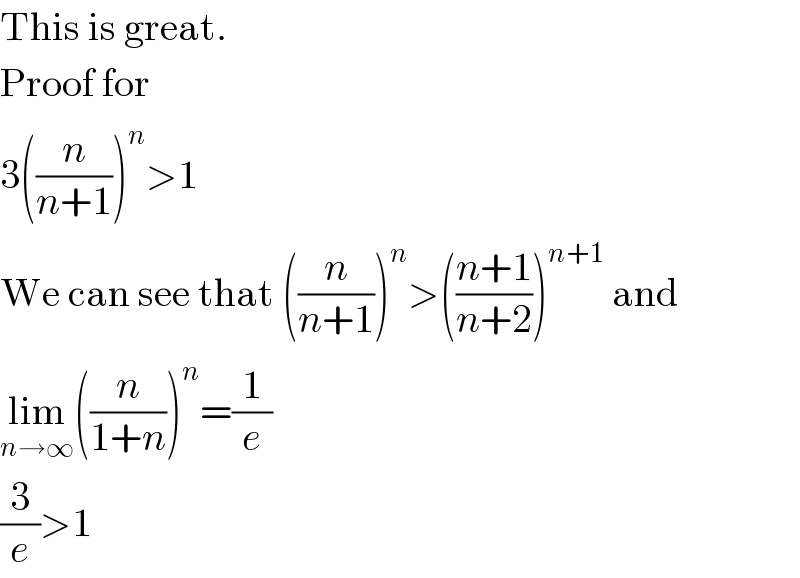
Question Number 13728 by prakash jain last updated on 22/May/17

$$\mathrm{Prove}\:\mathrm{that} \\ $$ $$\mathrm{n}!>\left(\frac{{n}}{\mathrm{3}}\right)^{{n}} \\ $$
Answered by mrW1 last updated on 23/May/17

$${Using}\:{mathematical}\:{induction}: \\ $$ $${for}\:{n}=\mathrm{1}\:{we}\:{have} \\ $$ $$\mathrm{1}!=\mathrm{1}>\left(\frac{\mathrm{1}}{\mathrm{3}}\right)^{\mathrm{1}} =\frac{\mathrm{1}}{\mathrm{3}}\:\Rightarrow\:{true} \\ $$ $${supposed}\:{it}'{s}\:{true}\:{for}\:{n},\:{i}.{e}. \\ $$ $$\mathrm{n}!>\left(\frac{{n}}{\mathrm{3}}\right)^{{n}} \\ $$ $${for}\:{n}+\mathrm{1}\:{we}\:{have} \\ $$ $$\left({n}+\mathrm{1}\right)!=\left({n}+\mathrm{1}\right){n}!>\left({n}+\mathrm{1}\right)\left(\frac{{n}}{\mathrm{3}}\right)^{{n}} \\ $$ $$=\left(\frac{{n}+\mathrm{1}}{\mathrm{3}}\right)^{{n}+\mathrm{1}} \left(\frac{\mathrm{3}}{{n}+\mathrm{1}}\right)\left(\frac{\mathrm{3}}{{n}+\mathrm{1}}×\frac{{n}}{\mathrm{3}}\right)^{{n}} \left({n}+\mathrm{1}\right) \\ $$ $$=\left(\frac{{n}+\mathrm{1}}{\mathrm{3}}\right)^{{n}+\mathrm{1}} \mathrm{3}\left(\frac{{n}}{{n}+\mathrm{1}}\right)^{{n}} >\left(\frac{{n}+\mathrm{1}}{\mathrm{3}}\right)^{{n}+\mathrm{1}} \\ $$ $${since}\:\mathrm{3}\left(\frac{{n}}{{n}+\mathrm{1}}\right)^{{n}} >\mathrm{1}\:\:\left(\ast\:{see}\:{proof}\right) \\ $$ $${so}\:{it}'{s}\:{also}\:{true}\:{for}\:{n}+\mathrm{1}. \\ $$ $$\Rightarrow{it}'{s}\:{true}\:{for}\:{all}\:{n}. \\ $$
Commented byprakash jain last updated on 23/May/17

$$\mathrm{This}\:\mathrm{is}\:\mathrm{great}.\: \\ $$ $$\mathrm{Proof}\:\mathrm{for} \\ $$ $$\mathrm{3}\left(\frac{{n}}{{n}+\mathrm{1}}\right)^{{n}} >\mathrm{1} \\ $$ $$\mathrm{We}\:\mathrm{can}\:\mathrm{see}\:\mathrm{that}\:\left(\frac{{n}}{{n}+\mathrm{1}}\right)^{{n}} >\left(\frac{{n}+\mathrm{1}}{{n}+\mathrm{2}}\right)^{{n}+\mathrm{1}} \:\mathrm{and} \\ $$ $$\underset{{n}\rightarrow\infty} {\mathrm{lim}}\left(\frac{{n}}{\mathrm{1}+{n}}\right)^{{n}} =\frac{\mathrm{1}}{{e}} \\ $$ $$\frac{\mathrm{3}}{{e}}>\mathrm{1} \\ $$
Commented bymrW1 last updated on 23/May/17

$${That}'{s}\:{good}\:{idea}! \\ $$ $${I}\:{wanted}\:{to}\:{try}\:{to}\:{prove}\:\mathrm{3}\left(\frac{{n}}{{n}+\mathrm{1}}\right)^{{n}} >\mathrm{1}\:{also}\:{using} \\ $$ $${mathematical}\:{induction}. \\ $$
